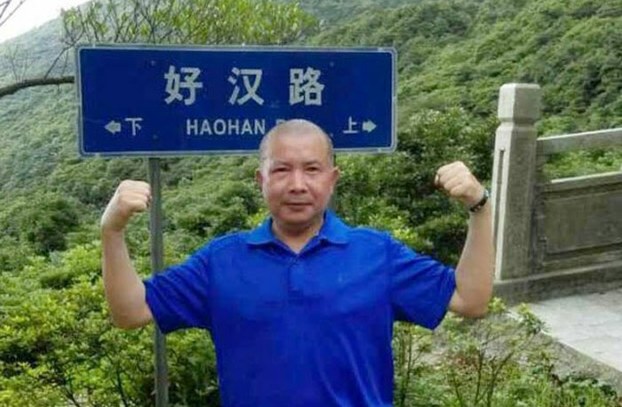Police in China's Shenzhen detain friends, relatives who enquired after missing loved ones
| Publisher | Radio Free Asia |
| Publication Date | 27 December 2016 |
| Cite as | Radio Free Asia, Police in China's Shenzhen detain friends, relatives who enquired after missing loved ones, 27 December 2016, available at: https://www.refworld.org/docid/58f9ca2513.html [accessed 21 May 2023] |
| Disclaimer | This is not a UNHCR publication. UNHCR is not responsible for, nor does it necessarily endorse, its content. Any views expressed are solely those of the author or publisher and do not necessarily reflect those of UNHCR, the United Nations or its Member States. |
2016-12-27
 Deng Hongcheng, one of 10 activists who went missing and believed to be detained in November in Shenzhen, in undated photo. Photo courtesy of an RFA listener
Deng Hongcheng, one of 10 activists who went missing and believed to be detained in November in Shenzhen, in undated photo. Photo courtesy of an RFA listener
A healthcare worker in the southern Chinese province of Guangdong is being held alongside his nephew on suspicion of subversion after his nephew went to inquire after his whereabouts, their relatives told RFA.
Deng Hongcheng was among a large group of 10 activists who went missing and are believed to detained last month in Shenzhen, which borders the former British colony of Hong Kong.
His nephew Deng Jianfeng also went incommunicado after going to inquire after his uncle's whereabouts, a relative has confirmed.
"My cousin just went to try to find [Deng Hongcheng], but now he is being held under the same charge, subversion of state power," a cousin who asked to remain anonymous told RFA.
"The only reason for this is that they were holding my uncle on a subversion charge; my brother never did or said anything to disrespect the [ruling Chinese Communist] Party," he said. "He was just an ordinary citizen."
He said the same date was given for both men's detention under "residential surveillance."
"We want to see if it's possible to send them some clothing and money, but that might not be possible," the cousin said.
Deng Hongcheng was one of at least 10 people detained in Shenzhen in a police operation that followed a Nov. 14 gathering.
Friends go incommunicado
The father of detainee Li Nanhai said he still hasn't received any formal notification of his son's detention from police.
"There was a group of five people who all shared a place in Yangmei village in Longgang district: Deng Hongcheng, Xiao Bing and Wang Wei, Huo Yan and Shen Li," the elder Li said.
"They arranged to meet a group of people for dinner at a restaurant not far from the Wuhe subway station, and then they all started to go incommunicado in the days that followed," he said.
"Their friends also went incommunicado after they went looking for them, including Dong Yan, Wang Jun and Huang Anyang, as well as Deng Hongcheng's nephew Deng Jianfeng and [our son] Li Nanhai," he said.
He said Wang Jianhua and Song Li had also gone missing around the same time.
"We are his parents, and we are both elderly people in our seventies now," his father said. "This is a disastrous thing to happen. If he is sentenced to between three and five years in jail, then that will be terrible."
Wang Jun's fiancee was told soon after his detention by police in Bantian district that he could also face subversion charges.
Anhui-based rights activist and former state prosecutor Shen Liangqing said the authorities appear to be using similar methods to those employed in a nationwide police operation targeting rights lawyers, legal firm employees and activists.
'Residential surveillance'
Under recent changes to China's Criminal Law, police are allowed to hold suspects under "residential surveillance" in an undisclosed location for up to six months in cases involving terrorism, crimes like spying or subversion that affect national security, or major corruption.
Suspects can be held without their families or lawyers being notified.
"They have to crack down on people like this, because any kind of civil organization or power is anathema to the Chinese Communist Party," Shen said. "Under a system where power is centralized and concentrated in a few hands, people power constitutes a threat."
"That's not to say that they didn't crack down before, but this year has been particularly harsh, and that has to do with President Xi Jinping himself, who as a second-generation revolutionary has is extremely keen to protect the regime in a hard-line way."
"The methods he is using to target [peaceful activism] are far harsher than those employed during the previous administration of [former presidents] Hu Jintao and Jiang Zemin," Shen said.
"Subversion of state power" carries a minimum jail term of 10 years in cases where the person is judged to have played a leading role, or where the consequences are deemed especially harmful.
Jailed Nobel peace laureate Liu Xiaobo is currently serving a 13-year sentence for "incitement to subvert state power."
Reported by Xin Lin for RFA's Mandarin Service, and by Hai Nan for the Cantonese Service. Translated and written in English by Luisetta Mudie.
Link to original story on RFA website
